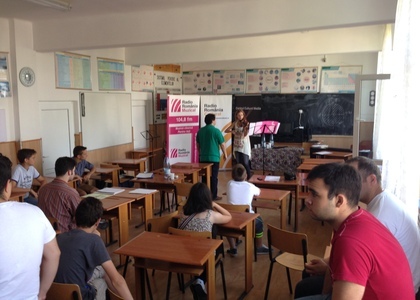> [Archived] Interviews

The Third Edition of the 'Playing at Altitude' Masterclass, Is Already Underway
The latter shared with us some of his impressions:
Mr. Răzvan Suma, the third edition of the "Playing at Altitude" masterclass is now taking place. How is the training of the participants going and which are your very first impressions?
Exactly the same first impressions we had three years ago, Ștefan Horvath - my violinist partner - and I. As a teacher, I attended many masterclass courses and this type of learning is, practically, the fastest method of student progress. Even if one has a great mentor at university or school, a masterclass course is so intense that the information practically persists in the participants' minds for months on end to help them grow a lot and put their training into practice…even if not at the moment, but later on. This kind of processing the information takes a lot of time. I think that there comes a time in our lives when we share what we learned when young.
What are the main criteria or qualities you consider when training the musicians who play the instruments?
Each student is different. This is why teaching a masterclass course is exhausting, because we have to listen to all the participants in one day; practically we are dealing with twelve different characters trained differently at different levels and having different psychological training… all different… and this is all not only very eclectic and nice, but also very fatiguing. You need to adapt yourself to each student in order to be able to work separately with each of them in a different manner.
The knowledge and experience your students gained from you during this masterclass course will take shape into two final concerts. Where will they take place and what profile will each of them have?
We end each course with two concerts. One of them is held in the Culture House in Poiana Stampei. Poiana Stampei is the place where we run this masterclass course; it is a fine example for all the Romanian villages. Things do happen in here. The concert on 25th July, will take place here and for the one on 26th July, we will go down to Bistrița where we will perform the last concert. They will not necessarily perform the programmes brought from home and perfected here, but they will also receive duets, trios and quartets to play; we will also perform an orchestral work -Albinoni's Adagio, which has already become our anthem. Each concert is very important because our students have the chance to practise going onstage and playing onstage, and that is the best possible exercise for their future performing careers.
Translated by Anca Romete and Elena Daniela Radu
MTTLC, the University of Bucharest














